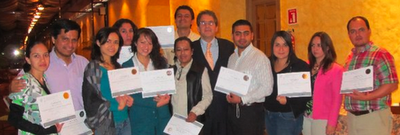
Participants in the last class came from Venezuela, Peru, Colombia, Bolivia and various parts of Mexico.
Over two years, the Center, a project of the Knight International Journalism Fellowship program, offered 15 online training courses in Spanish to some 500 journalists from 22 countries as well as in-person technical training to more than 200 of the best performers. On a Saturday in December, the 15th class to pass through the Digital Journalism Center in Guadalajara, Mexico, had its recognition ceremony. It was also my last day directing the program begun in 2008 by the University of Guadalajara and International Center for Journalists.
Each participant in the Public Service Journalism course had spent five weeks studying online and the best were invited to Guadalajara to begin work on a final project:
<li>Elizabeth Estevez, agricultural reporter for El Diario in Bolivia, is planning a multimedia report on the shortage of wheat production in her country.</li>
<li>Luis Daniel Palmillas, a radio and print reporter in Rio Bravo, Mexcio, on the U.S. border, is working on a website that would allow citizens to lodge complaints about city services, track the response and hold officials accountable. </li>
<li>Carlos Andrés Valencia Masso, who lost his father in the armed conflict in Colombia, has plans to expand his web-based reporting on movements of peaceful resistance to violence.</li>
In Guadalajara the participants received hands-on technical training in use of video, audio, mapping, marketing and other techniques of online publishing. I was impressed with their commitment to serving their communities.
Journalists from 22 countries participated
Over two years, the Center, a project of the Knight International Journalism Fellowship program, offered 15 online training courses in Spanish to some 500 journalists from 22 countries as well as in-person technical training to more than 200 of the best performers.
Webmaster Luis Fernando Gonzalez Fernandez and administrator Norma Lilia Cerda Martinez, both employees of the University, are keeping things running until the new director is announced.
My wife, Cindy, and I headed back to the States for the holidays and prepared for the next chapter in our wandering life, which will probably continue somewhere in Latin America.
Designing courses for professionals
When I arrived in Guadalajara, the University already had an established distance-learning program but there were no online courses in journalism. I worked with Carmen Coronado, one of the University´s experts in designing courses for virtual platforms, to prepare courses for the Center. She helped me understand how to create engaging activities and lead discussions in the online environment.
Experienced professionals need a different kind of learning environment than college students. We made every participant´s work visible to every other participant, and they had to comment on each other´s work. This kind of feedback from peers was at least as important to participants as my comments.
In all, I designed six courses in Spanish for the Center and taught them online. I invited experts in digital technologies to teach the in-person courses.
In the process of participating in the course forums, I learned a lot of colloquial Spanish. Each country has its own version of newsroom slang. But journalists are pretty much the same anywhere in the world: irreverent, smart, funny, committed and passionate about their work. I love hanging out with them, even when it´s just online.
Sustainability: Online master´s degree in digital journalism
Manuel Moreno Castañeda, rector of the Virtual University in the University of Guadalajara, urged me to create an academic team in the second year of the program to assure sustainability.
We invited professors to participate in the courses, and a team of a half-dozen academics also helped design a master´s degree in digital journalism. This master´s, which has a heavy emphasis on participants creating their own digital media, will be one of the few online programs in digital journalism in the Spanish-speaking world. (Descriptions of the proposed courses are here.)
Safe practices for journalists covering violence
Mexico has become one of the most dangerous places in the world to practice journalism because of the linked interests of druglords and corrupt public officials. Reporters and media outlets that reveal corruption put themselves at risk.
As a response, the Digital Journalism Center, with grants totaling $55,000 from the U.S. Embassy, created an online course on "Safe practices for journalists" for more than 100 Mexican journalists and then held three in-person seminars.
Jorge Luis Sierra (left), an editor with decades of experience covering border issues, designed the course. Another Mexican journalist, Darío Dávila (second from left), who reports for several international publications, gave the course online.
Both of them participated in the in-person training attended by journalists like Claudia Beltrán, reporter for the daily Noroeste (next to me at the recognition ceremony).
Participants in the courses created all the content for a website that contains tactics and strategies that journalists can use to reduce the risks of the profession while still providing useful information to their communities.
After hearing the stories from course participants about the daily threats and dangers they confront, I was particularly gratified that we were able to offer them some help.


